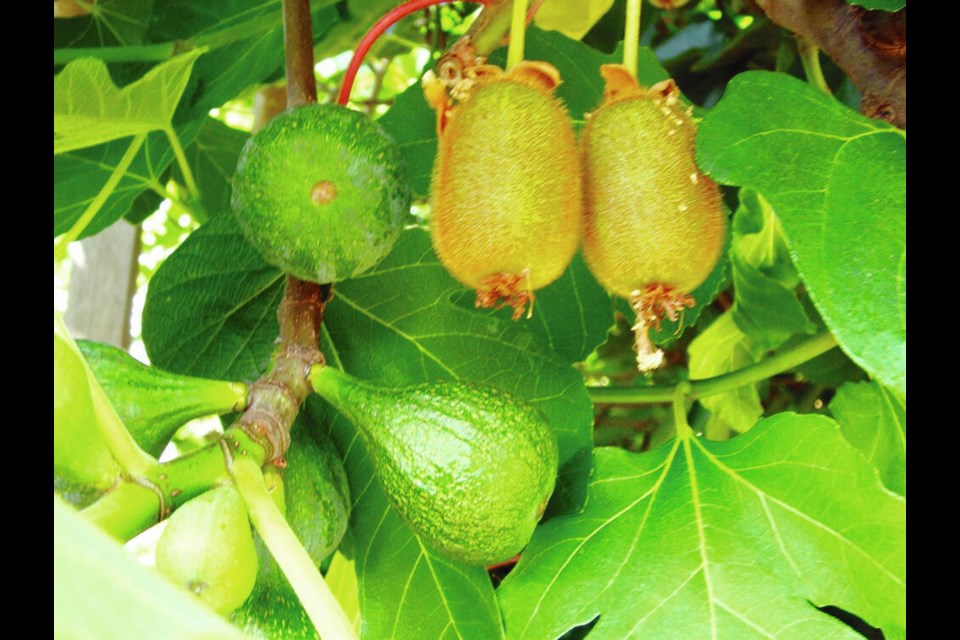Dear Helen: In my garden I have two 15-year old Concord grape vines that are prolific producers, but they ripen very late, into October last year. I’ve often wondered whether thinning the foliage enough to expose the grape clusters to sunshine would hasten ripening. All the grapes have been hidden under leaves since the clusters formed. I’ve done some thinning of the vines to improve air circulation, but the clusters are still hidden from the sun.
J.B.
It is usually a good idea to trim the vines to open “windows” of sunlight onto grape clusters. This pruning helps the grapes remain disease-free and fosters early ripening.
I do a similar pruning of the female kiwi vine in summer, once fruits have set and begun to develop. I prune away new stems that have grown over the fruit, creating a canopy of shade. Exposure to sun enhances the sizing up, sweetness and flavour of the fruit.
I describe pruning for sun exposure as “usually” beneficial because of uncertain future weather patterns. Sun and heat conditions seem to be changing rapidly. This year brought high heat and hot sun that damaged plantings I’d had easy success with for several decades.
I’d certainly do the grape trimming now, but be watchful of weather forecasts next year and do research on possible heat effects on the plants as temperatures rise. Who knows? Perhaps in future years, grapes and other fruits will need light shade, as our tomatoes do to avoid sunscald.
Dear Helen: The beans on our vines have been nibbled away along the pod edges. Sometimes we find beans on the ground. Have you any idea what might be doing this, and is there anything we can do to protect the beans?
S.L.
The nibblers are probably mice or rats. Mice in particular are attracted to bean pods. Various kinds of traps are available to place near plants to be protected. Avoid traps that use poisons or snapping mechanisms that could harm pets or children. Electronic traps are clean and simple.
I’ve kept mice out of my second-hand “holey” metal garden shed by placing cotton balls saturated in peppermint oil around the base of the walls inside the shed. The rodents do not like mint.
On a hot, sunny day last month I emptied and cleaned the shed, sorted out and repackaged the piles of muddle, and put everything back with a mind to neatness and convenience — the pail holding hand tools positioned right by the doorway, long-handled tools lined up behind them against a side wall, and lime, natural-source fertilizer mixes and other gardening essentials lined up on a bench against the other wall.
The process was arduous, but immensely satisfying. That uber-neat (for the moment) shed has made gardening sessions much more orderly and pleasurable.
As I put the last of the shed’s contents in place, I looked around and thought of mice, and mint. I had no peppermint oil on hand for soaking into cotton balls or making into a spray (two teaspoons in one cup water), but I had recently bought a pungently mint-flavoured mouth wash that I found disgusting used for its intended purpose.
Be aware that this is no orthodox procedure, but I diluted the minty brew into a little hand sprayer that delivers a very fine mist, which I applied to the base of the inside and outside walls. I’ll do this again while the weather is still warm and dry, and revert to the peppermint oil-soaked cotton balls for the winter.
GARDEN EVENTS
Abkhazi Garden day of peace. Abkhazi Garden, 1964 Fairfield Rd. in Victoria, is celebrating the International Day of Peace on Thursday, Sept. 21, with a children’s ceremony at 1 p.m. and a showing of the documentary Abkhazi Garden — Sanctuary from War.
HCP plant sale. The Horticulture Centre of the Pacific, 505 Quayle Rd. in Saanich, is hosting its annual fall plant sale on Friday, Sept. 22 (members and volunteers only), and Saturday, Sept. 23, 9 a.m.to 4 p.m. both days. Garden admission is free. All plants are discounted by 25 per cent. HCP staff, Master Gardeners and volunteers will be on hand to advise on purchases. Plant availability list will be on the close to the sale dates.



